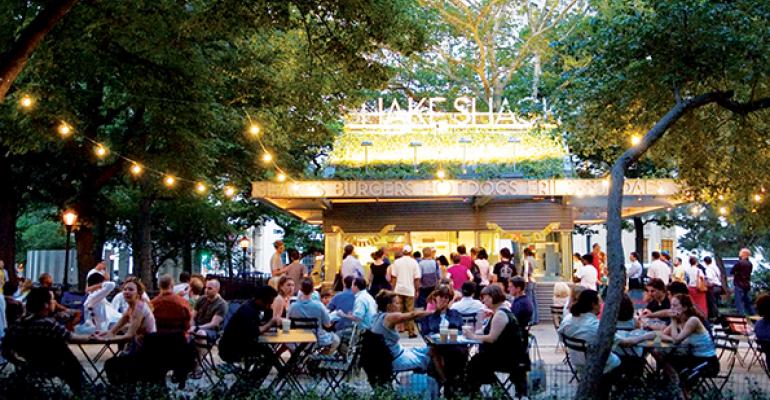Shake Shack Inc. made its public debut Friday in what could be the biggest restaurant company IPO ever.
The New York City-based fast-casual burger operator’s stock was in high demand before it even started trading Friday. The stock was priced late Thursday at $21 a share, well above the estimated range of $17 to $19 a share, enabling the company to raise $105 million.
The stock quickly jumped to more $50 a share in early trading, an increase of nearly 140 percent. The surge put the value of Shake Shack at nearly $1.8 billion — an extraordinary valuation for a chain with just 63 units — or more than $28 million per location.
The valuation matches Shake Shack’s outsized reputation. Danny Meyer, the 56-year-old restaurateur and owner of Union Square Hospitality Group LLC, started Shake Shack as a hot dog cart in New York City’s Madison Square Park in 2001. The chain opened its first unit in 2004, and quickly built a reputation for its high-quality burgers.
Since then, Shake Shack has effectively used social media to build a reputation that far exceeds its size, enabling it to open new units to massive crowds. Locations in Manhattan have become tourist attractions that boast average unit volumes of $7.4 million. Overall, its 36 domestic locations average $5 million in sales per year.
The company touted its popularity in IPO roadshow materials. To emphasize that point, Shake Shack gave away breakfast and burgers on Wall Street Friday to celebrate its debut.
Institutional investors that participate in IPOs, many of which are in New York, know the chain’s reputation well. Investors are eager to snap up stock in high-growth, fast-casual restaurant chains like Shake Shack in the hopes of equaling investments in companies like Chipotle Mexican Grill Inc., which debuted in 2006.
Chipotle, like Shake Shack, saw massive interest in its IPO before its offering, and debuted at $22 a share. Its share price doubled on its first day of trading to $44, and has skyrocketed ever since. Investors who bought $1,000 worth of shares at Chipotle’s peak opening day price would have $16,239, as the company’s share price currently exceeds $700.
Over the past two years, restaurant companies have averaged first-day increases of nearly 70 percent, and several have doubled on their debuts. That includes Los Angeles-based Habit Restaurants Inc., parent to better-burger chain The Habit Burger Grill, which rose nearly 120 percent in its debut in November. Shake Shack is on track to best any recent IPO performances, including Chipotle’s.
Meyer owns 21 percent of Shake Shack shares. The $21 opening price puts the value of his shares at $156 million.
The question is whether Shake Shack can maintain its momentum as it expands. The company says it can grow to 450 locations in the U.S., but already plans to see its unit volumes shrink as it moves into smaller markets further from New York.
Shake Shack expects unit volumes to settle in the $2.8 million to $3.2 million range. Its operating profit margins are expected to be in the range of 18 percent to 22 percent.
The company will use the funds raised from the debut to pay off debt, expand and make a payment to existing shareholders.
The company reported $83.8 million in revenue in the first three quarters of 2014, according to SEC documents, a 41-percent increase from a year ago. The company will trade on the New York Stock Exchange under the symbol SHAK, and after the IPO will operate as a separate company from Union Square Hospitality Group.
In addition to Union Square Hospitality Group, Shake Shack’s sponsors include the private-equity firm Leonard Green & Partners and the hedge fund Select Equity Group.
J.P. Morgan Securities LLC and Morgan Stanley & Co. LLC acted as joint lead book-running managers for the offering. Barclays Capital Inc., Goldman Sachs & Co., and Jefferies LLC also acted as book-running managers, while William Blair & Company LLC and Stifel were co-managers.
Contact Jonathan Maze at [email protected].
Follow him on Twitter: @jonathanmaze





